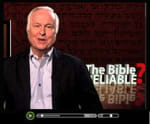Bible Origin
Bible Origin - Divine Inspiration
When examining Bible origin, many of today's liberal scholars look everywhere but the Bible. However, the Bible tells us that the origin of the Bible is God Himself. In 2 Timothy 3:16, we read that all scripture is inspired by God. The Greek word used for inspiration is theopneustos, which means "God-breathed." In 2 Peter 1:21, we understand that each writer was "carried along" by God. Therefore, God used each of the Bible's 40 authors, including their diverse cultural backgrounds, personalities and positions, to deliver His divine Word to all mankind.
Bible Origin - The Word of God
It seems that the question of Bible origin turns on the truth of its divine inspiration. In Luke 24:27,44; John 5:39; and Hebrews 10:7, Jesus says that what was written about him in the Old Testament would come to pass. Romans 3:2 and Hebrews 5:12 refer to the Old Testament as the Word of God. We read in 1 Corinthians 2:13, "This is what we speak, not in words taught us by human wisdom but in words taught by the Spirit." This is confirmed in 2 Timothy 3:16. In 1 Thessalonians 2:13, Paul when referring to that which he had written says, "...you accepted it not as the word of men, but as it actually is, the Word of God..." Peter speaks of the inspiration of Paul's writings in 2 Peter 3:15-16, where he maintains that, "...Paul also wrote to you with the wisdom that God gave him. He writes the same way in all his letters..." Earlier, in 2 Peter 1:21 Peter writes, "For prophecy never had its origin in the will of man, but men spoke from God as they were carried along [moved] by the Holy Spirit." And then finally in Revelation 22:18,19 the writer John, referring to the book of Revelation states, "...if anyone adds anything to them, God will add to him the plagues described in this book. And if anyone takes words away from this book of prophecy, God will take away from him his share in the tree of life..."
"The Bible must be the invention either of good men or angels, bad men or devils, or of God. However, it was not written by good men, because good men would not tell lies by saying 'Thus saith the Lord;' it was not written by bad men because they would not write about doing good duty, while condemning sin, and themselves to hell; thus, it must be written by divine inspiration" (Charles Wesley, McDowell, Evidence That Demands a Verdict, 1990:178).
Bible Origin - Authenticity of New Testament Scripture
A primary attack against divine Bible origin is that the books of the New Testament were agreed upon (canonized) by men hundreds of years after the books were written. Actually, the fathers of the early Christian church reveal that most of the New Testament books were accepted as scripture almost immediately. For instance, in 2 Peter 3:16, the writer takes for granted that Paul's letters were already considered inspired scripture on the same level as the Old Testament. In 1Timothy 5:18, Paul joins an Old Testament reference and a New Testament reference and calls them both Scripture. The need for official canonization of the New Testament scriptures only came about because of certain heresies that were being spread throughout the church starting in the mid to late second century. For instance, Marcion created his own religion by only teaching from ten of Paul's letters and certain portions of Luke. In addition, the Gnostics, especially in Alexandria, were introducing new "secrets" to the standard Christian doctrine, including new gospel accounts altogether.
For the church leaders in the mid second century, the four Gospels were baseline authority in their teachings. In about 170 AD, Irenaeus cited 23 of the 27 New Testament books, omitting only Philemon, James, 2 Peter and 3 John. The Muratorian fragment, written about the same time, attests to the widespread use of all the New Testament books except Hebrews, James, 1 Peter and 2 Peter. However, other church fathers had already cited those omitted books in various writings defending against Gnostic doctrines. The Codex Barococcio from 206 AD includes 64 of the 66 books of today's Bible. Esther and Revelation were omitted, but they had already been declared as inspired scripture by Justin Martyr, Irenaeus, Clement, Tertullian and the Muratorian Canon. In 230 AD, Origen declared that all Christians acknowledged as scripture the four Gospels, Acts, the epistles of Paul, 1 Peter, 1 John and Revelation.
By the early 300's, all of the New Testament books were being used in the mainstream church body. In 367 AD, Athanasius formally circulated the Easter Letter that listed all 27 books as canonical. The Synod of Hippo (393 AD) and the third Synod of Carthage (397 AD) also recognized these 27 books as canonical. In addition, during this time, the highly influential church fathers, Jerome (340-420 AD) and Augustine (354-430 AD) published their lists of 27 books completing the New Testament.
It's important to remember that the canon of the New Testament was not the result of any pronouncement by any official of the church or any organizational body. Rather, the canon was determined by the authoritative use of these books right from the start by the rapidly expanding church of the first and second centuries. The New Testament canon was merely a process of formal recognition of already recognized scripture, to defend against the various forms of Gnosticism and heresy that were starting to creep throughout the ever-expanding church.
What is your response?



